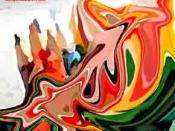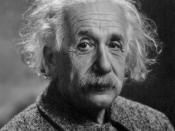It is generally agreed upon by many that a large number of the world's fundamental problems, knowledge and inventions have been produced and solved and therefore advanced by a few good men in comparison; and that a large number of these solutions have came about as a result of some visualization process.
For example:
*Kekule's dream about a snake in his fireplace forming a ring by biting its own tail led him to the structure of the benzene ring, the basis of all organic chemistry.
*Elias Howe's nightmare of being attacked by cannibal wielding spears that happened to have holes in their heads, gave him the break through he needed to solve the last remaining problem before piecing together the sewing machine.
*Einstein's "train ride on a beam of light" which taught him--and us--his Theories of Relativity and remade the whole of physics, which helped remake the whole of science.
A survey of published references reveals there has always been an aura of mysticism attributed to geniuses, by their biographers and others who study them. The psychologist Sigmund Freud suggested that there is a lot of commonality between highly gifted people and neurotics, whose behaviours are marked by anxiety and other compulsive nervous disorders. In the discussion, we will explore characteristics of creativity and the creative individual and also introduce some modern theories of creativity.
It seems to be that genius are born and not made, but there are many methods used by genius that everyone could learn from. Let us first remark on some characteristics of a genius that personify creativity.
*Genius may have a broad interest in many unrelated areas, and as a result, display curiosity in many genres of studies. In addition, they may be constantly questioning the current state and body of knowledge.
*Geniuses are prolific...


